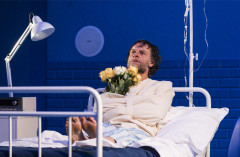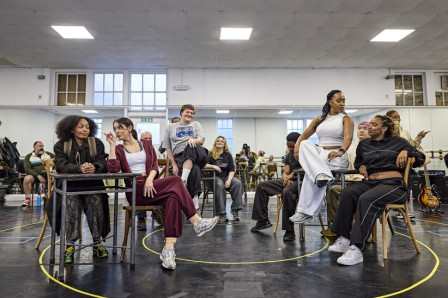Review: PÉRICLÈS, PRINCE DE TYR by CHEEK BY JOWL at The Barbican
 So, it’s Pericles. That Shakespeare play you, erm, know and love. In… French? With a frame narrative which places the action of the Shakespeare play entirely in a different character’s head? Sure, I guess…
So, it’s Pericles. That Shakespeare play you, erm, know and love. In… French? With a frame narrative which places the action of the Shakespeare play entirely in a different character’s head? Sure, I guess…
Welcome to Cheek by Jowl’s Périclès, Prince de Tyr: a play by turns lucid and perplexing, moving and maddening. Let’s unpack this a little. The 1619 co-authored play, recounting the adventures, loves, losses, and refindings of wandering hero Pericles, is thoroughly reimagined here as taking place entirely within the brain of a comatose man (Christophe Grégoire), who appears to have lost the use of his mental faculties. It is out of this damaged brain that the action of Pericles bursts. Our hero is visited by his wife (Camille Cayol), daughter (Valentine Catzéflis), and daughter’s partner (Xavier Boiffier), who supply the other roles in the drama along with the doctor (Cécile Leterme), and two male nurses (Guillaume Pottier and Martin Nikonoff).
The real question, as always, is did any of these big conceptual leaps help? The answer, unequivocally, is yes: with the emotional weight of the story at the very least. It soon becomes clear that the purpose of this is to ground and dignify the arc of Pericles’ loss and eventual reunion with his wife and daughter, believed dead, which (spoilers) collides with our comatose hero’s reunion with his own family. Director Declan Donnellan’s gambit helps this overall journey to land convincingly. Restaging a classic play to the psyche of a troubled individual scarcely breaks fresh ground; the brilliance here is how well-organised around this central concept the whole production feels.
The gambit of using a French text and matching cast, meanwhile, apologises for the questionable state of the verse when viewed alongside other Shakespeare plays: certainly, the ability to only choose desirable passages smooths over the textual incompleteness of the original. There’s certainly a strength to moments where choice phrases appear above the stage picture, lending a monumental quality to Shakespeare’s verse while simultaneously showing immense cheek by refusing to perform it.
But asking us to watch action unfolding onstage, listen to text in French, and read Shakespeare in English, often all in the space of about 5 seconds, requires some serious theatre literacy; enough to put a connoisseur on their mettle. (Well, what else does one go to the Barbican expecting.)
It did mean, however, that for much of the middle I had no idea what was going on: Pericles’ meanderings lost me somewhat and the Frenchness of it all didn’t exactly help me get back on track.
There’s also something a little po-faced about the whole thing: one memorably nutty moment near the beginning (sadly all too isolated) stands out as a highlight.
Nevertheless, the cast uniformly cope brilliantly with the shifts from total fourth-wall naturalism to more theatricalised characterisation in the Pericles sections; and Nick Ormerod’s superb design containing everything in a too-blue-to-be-true, yet perfectly naturalistic set: real and yet not real.
It is an axiom of dramaturgy and theatre criticism that obfuscation cannot be commended, which is what must hold it back in these eyes. But let’s be honest: despite some good scenes, Pericles on its own is not a great play. Cheek by Jowl’s solutions for its problems certainly don’t make life simple for themselves or the audience, but they certainly keep us on our toes, and tie the whole thing together much better than a ‘straight’ production could have hoped to. It’s also rare in London to see work with such a consciously internationalist flair produced by a British company. This is highly commendable. But don’t watch it tired.
Latest News

 Review: GRINDR MOM at Waterloo East Theatre
21 February 2026 at 11:24
Review: GRINDR MOM at Waterloo East Theatre
21 February 2026 at 11:24

 TV & Film-inspired theatre shows to see in London
20 February 2026 at 17:39
TV & Film-inspired theatre shows to see in London
20 February 2026 at 17:39

 Cast and creatives announced for HEART WALL at Bush Theatre
19 February 2026 at 15:53
Cast and creatives announced for HEART WALL at Bush Theatre
19 February 2026 at 15:53

 Rehearsal images released of new West End cast of HADESTOWN
19 February 2026 at 12:22
Rehearsal images released of new West End cast of HADESTOWN
19 February 2026 at 12:22
